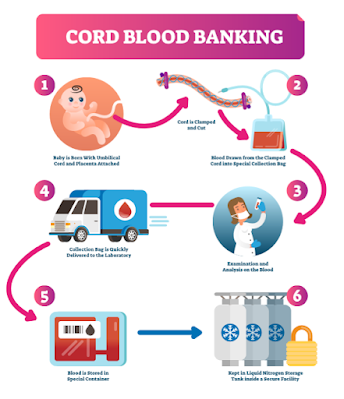What is Cord Blood? Cord blood is the blood that remains in the umbilical cord and placenta after a baby is born. It is a rich source of stem cells, which have the ability to develop into many different types of cells in the body. Benefits of Banking Cord Blood Potential future treatment for medical conditions: Cord blood stem cells have been used to treat a variety of medical conditions, including blood disorders, immune deficiencies, and genetic disorders. Non-controversial: Unlike embryonic stem cells, cord blood stem cells do not raise ethical concerns. Easy to collect: Cord blood can be collected at the time of birth with minimal risk to mother or baby. Risks of Banking Cord Blood Cost: Cord blood banking can be expensive and there is a yearly fee for storage. Limited use: Currently, cord blood stem cells can only be used for certain medical conditions and there is a chance that the stored stem cells may not be a match for a future medical need. Technica...
Posts
- Get link
- X
- Other Apps

Banking Cord Blood: An Investment in Your Family's Health Banking Cord Blood: An Investment in Your Family's Health Cord blood is a rich source of stem cells, which are the building blocks of the body's blood and immune system. By banking cord blood, families can ensure that they have a readily available source of stem cells in the event of a medical emergency or treatment. What is Cord Blood Banking? Cord blood banking is the process of collecting and storing the blood from the umbilical cord and placenta after a baby is born. This blood is then stored in a bank, where it can be safely preserved for future use. Why is Cord Blood Banking Important? Cord blood stem cells have been used in the treatment of over 80 life-threatening diseases, including certain types of cancer, blood disorders, and immune system disorders. By banking cord blood, families have the potential to save a life in the future, whether it be their own or a lov...
- Get link
- X
- Other Apps
Cord Blood: Stem Cells, the Building Blocks of Health Cord Blood: Stem Cells, the Building Blocks of Health Cord Blood: Stem Cells, the Building Blocks of Health Cord blood is the blood that remains in the placenta and umbilical cord after birth. This blood is rich in stem cells, which are the building blocks of the body's blood and immune system. What are Stem Cells? Stem cells are unique cells in the body that have the ability to develop into many different types of cells, including blood cells and immune cells. This ability makes them a valuable resource for treating a variety of medical conditions. Benefits of Cord Blood Stem Cells Cord blood stem cells have several advantages over other sources of stem cells. First, they are easy to collect and can be stored for future use. Additionally, cord blood stem cells are less mature than adult stem cells, which makes them less likely to cause rejection when used for medical treatments. Fina...
- Get link
- X
- Other Apps

The Benefits of Cord Blood Banking The Benefits of Cord Blood Banking Cord blood banking is the process of collecting and storing the blood that remains in the umbilical cord and placenta after a baby is born. This blood is rich in stem cells, which are immature cells that have the ability to develop into different types of cells in the body. Cord blood stem cells are a promising source of treatment for a wide range of diseases and disorders, including cancer, blood disorders, and immune system disorders. 1. Potential for life-saving treatments One of the most significant benefits of cord blood banking is the potential for using cord blood stem cells to treat a variety of diseases and disorders. Cord blood stem cells have been used to treat more than 80 different conditions, including leukemia, anemia, and immune system disorders. In some cases, cord blood stem cells have even been used to regenerate damaged tissue, such as in the case of spinal cord injuries. 2. ...
- Get link
- X
- Other Apps
Cord Blood Banking: What You Need to Know Cord blood banking is the process of collecting, processing, and storing cord blood for potential future medical use. Cord blood is the blood that remains in the placenta and umbilical cord after a baby is born. It is a rich source of stem cells, which are cells that can develop into various types of cells in the body and have the potential to regenerate and repair damaged tissue. Private vs. Public Cord Blood Banking There are two main options for storing cord blood: private cord blood banking and public cord blood banking. Private cord blood banking involves storing the cord blood for the exclusive use of the family, while public cord blood banking involves making the cord blood available for use by anyone in need of a stem cell transplant. Private Cord Blood Banking Private cord blood banking can be a good option for families who have a history of certain medical conditions that may be treated with stem cells from co...
- Get link
- X
- Other Apps

Viacord and Americord: Leading Cord Blood Banking Companies Cord blood is the blood that remains in the placenta and umbilical cord after a baby is born. It is a rich source of stem cells, which are cells that can develop into various types of cells in the body and have the potential to regenerate and repair damaged tissue. Cord blood banking is the process of collecting, processing, and storing cord blood for potential future medical use. There are several cord blood banking companies to choose from, but Viacord and Americord are two of the leading providers in the field. Viacord Viacord is a leading provider of cord blood banking services, with over 25 years of experience in the field. The company offers both private cord blood banking, in which the cord blood is stored for the exclusive use of the family, and public cord blood banking, in which the cord blood is made available for use by anyone in need of a stem cell transplant. Viacord follows strict guidel...
- Get link
- X
- Other Apps

Cord Blood: What You Need to Know Cord blood is the blood that remains in the placenta and umbilical cord after a baby is born. It is a rich source of stem cells, which are cells that can develop into various types of cells in the body and have the potential to regenerate and repair damaged tissue. Uses of Cord Blood Cord blood has been used in medical treatments for over 25 years and has helped to save the lives of thousands of people around the world. It is particularly useful in the treatment of blood disorders such as leukemia and lymphoma, as well as certain inherited immune system and metabolic disorders. Storing Cord Blood There are two main options for storing cord blood: private cord blood banking and public cord blood banking. Private cord blood banking involves storing the cord blood for the exclusive use of the family, while public cord blood banking involves making the cord blood available for use by anyone in need of a stem cell transplant. Pri...